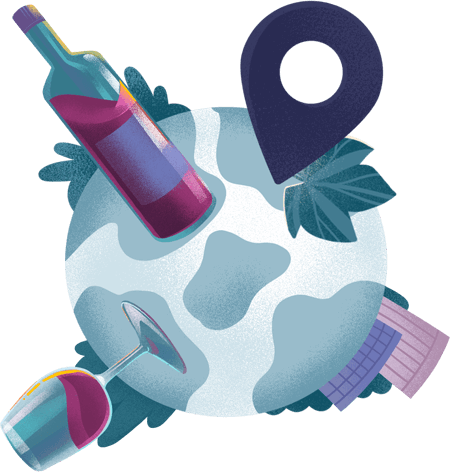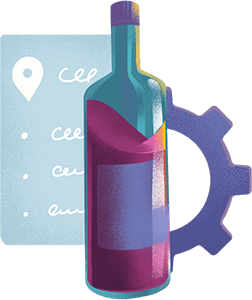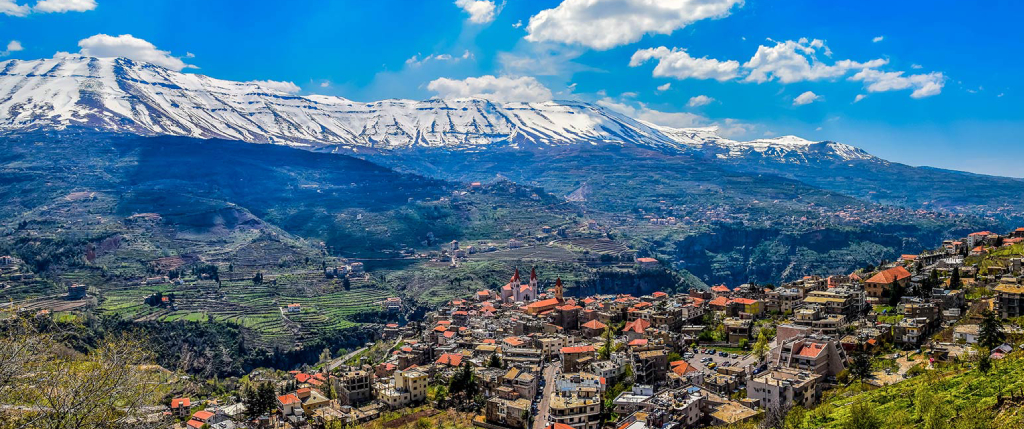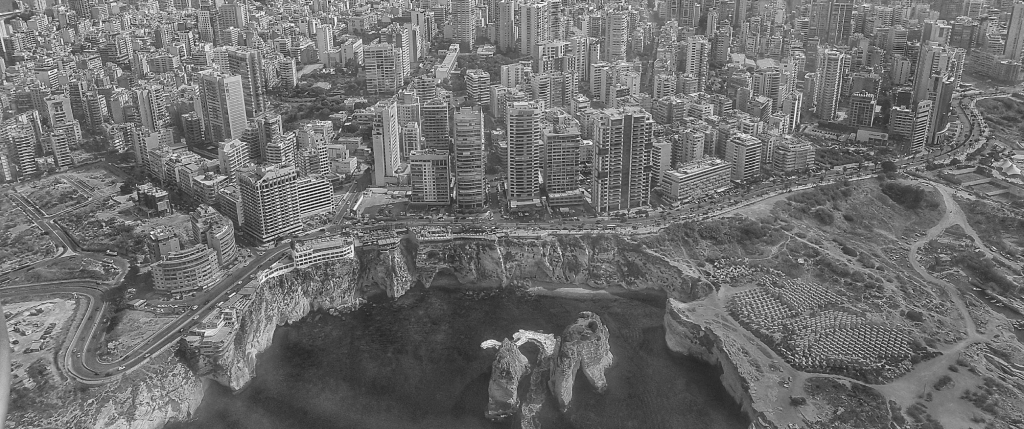Knowledge base
Wine Distributors in Lebanon

Countries in the database
The information about the countries that are represented in the distributor database. The section describes each country, the number of contacts and features of wine distribution.

How to Use Vinaty Database
Step by step guide how to quickly and conveniently work with a database of wine distributors. How to register, download contacts, add contacts to bookmarks and much more.
Documentation
- Free Trial Access and how to obtain it
- How to gain full access to the database of wine importers
- How to download contacts of wine distributors as a file
- How to open a downloaded CSV file and what is this format
- Why do I need folders in the application and how to use them
- What is a discount coupon and how to apply it to get a discount
- How to save my search query to start from it next time
- What does 'downloads' and 'views' mean?
Countries
- Albania
- Andorra
- United Arab Emirates
- Afghanistan
- Angola
- Anguilla
- Antigua and Barbuda
- Armenia
- Argentina
- Austria
- Australia
- Aruba
- Azerbaijan
- Bosnia and Herzegovina
- The Bahamas
- Bahrain
- Bahamas
- Bangladesh
- Barbados
- Belarus
- Belgium
- Bulgaria
- Burundi
- Brunei Darussalam
- Bolivia
- Bonaire
- Brazil
- Botswana
- Cambodia
- Cameroon
- Canada
- Chile
- China
- Croatia
- Colombia
- Congo
- Cote D`ivoire
- Costa Rica
- Cook Islands
- Cyprus
- Czech Republic
- Cuba
- Curacao
- Fiji
- Finland
- France
- France, Metropolitan
- French Polynesia
- Iceland
- India
- Indonesia
- Ireland
- Israel
- Italy
- Jamaica
- Japan
- Jordan
- Kazakhstan
- Kenya
- Kuwait
- Latvia
- Lebanon
- Liechtenstein
- Lithuania
- Luxembourg
- Namibia
- Nepal
- Netherlands
- New Caledonia
- New Zealand
- Nicaragua
- Niger
- Nigeria
- Northern Ireland (UK)
- Norway
- Panama
- Papua New Guinea
- Paraguay
- Peru
- Philippines
- Poland
- Portugal
- Puerto Rico
- Qatar
- Saint Lucia
- San Marino
- Saudi Arabia
- Scotland (UK)
- Senegal
- Serbia
- Seychelles
- Singapore
- Slovakia
- Slovenia
- South Africa
- South Korea
- Spain
- St. Helena
- Sweden
- Switzerland
- Taiwan
- Tanzania
- Thailand
- Turkey
- Turks and Caicos Islands
- Venezuela
- Vietnam
- Wales (UK)
- Zambia
- Zimbabwe
About Lebanon
The Republic of Lebanon is a country in the Middle East, West Asia, and on the eastern coast of the Mediterranean Sea. Capital: Beirut, Official languages: Arabic, Continent: Asia. Lebanon is a mountainous country: almost 80% of its territory is located above 500 m above sea level. The climate is Mediterranean. Beirut is called the “Paris of the East” for its characteristic pro-European appearance. Lebanon is endowed with magnificent mountain scenery, majestic ancient ruins, and unbridled hospitality.
It is said that there are almost more sights in Lebanon than tourists: Phoenician cities and medieval fortresses, cliffs and caves, Maronite monasteries and mountain castles, emir’s palaces, works by Zaha Hadid and old oriental markets – separate universes where time has been preserved. And incredibly delicious food: according to the American guidebook Travel+Leisure, Beirut is recognised as the best city for gastrotourism.

What alcoholic beverages are popular and enjoyed in Lebanon?
Arak (Arak is a traditional Lebanese spirit and considered the national drink of Lebanon). Wine, Beer, Whiskey, Cocktails and Mixed Drinks.
On what occasions is it customary to drink wine in Lebanon?
Wine is commonly consumed during meals and social gatherings in Lebanon. Festivals and Events. Also Wine plays a significant role in wedding celebrations and engagements. Religious Celebrations, Social and Business Gatherings. Wine is also enjoyed casually, whether it’s at home, in restaurants, or at bars.
What are the most popular international wines in Lebanon?
Wines from France, Italian Wines, Spanish Wines. Wines from Australia, the United States, Argentina, Chile, South Africa and Others.
What are the popular choices among wine drinkers in Lebanon?
Red Blends, Châteauneuf-du-Pape Style Wines, Chardonnay, Rosé wines, Sparkling Wines, Lebanese Indigenous Varietals.

Where can you buy wines, fine wines in Lebanon?
Wine Shops and Boutiques (Enoteca, Vintage Wine Cellar, Le Vignoble, The Wine Teller, etc). Supermarkets and Hypermarkets (Spinneys, Carrefour, and TSC have a good wine selection). Online Wine Retailers. Wineries and Cellar Doors. Restaurants and Bars.
Where can you buy natural, organic, bio, and vegan wines in Lebanon?
Specialty Wine Shops. Online Wine Retailers. Farmers’ Markets and Organic Stores. Wineries with Organic or Biodynamic Certification.
Does Lebanon have its own wine production?
Lebanon has a long and rich history of wine production. Lebanon’s wine production primarily centers around the Bekaa Valley.
What are the main distribution channels for wine importers in Lebanon?
Importers and Distributors. Retailers and Wine Shops. The hospitality sector, including restaurants, bars, and hotels. Online Wine Retailers. Direct Sales to Consumers.

What organization in Lebanon does regulate wine importation?
The regulatory body responsible for overseeing the importation, production, and sale of alcoholic beverages, including wine, is the Lebanese Ministry of Economy and Trade. Within the Ministry, the Directorate General of Internal Trade (DGIT) is responsible for regulating and supervising the importation and distribution of alcoholic beverages, including wines.
What are key aspects related to wine import in Lebanon?
Licensing and Permits. Customs Duties and Taxes. Labeling and Documentation. Quality Control and Standards. Compliance with Legal and Regulatory Requirements.
What are key aspects related to wine export into Lebanon?
Importer Identification. Export Documentation. Labeling Compliance. Certification and Documentation. Customs Duties and Tariffs. Transportation and Logistics. Compliance with Import Regulations.
What exhibitions and fairs are organized in Lebanon for wine producers and wine importers?
Vinifest (it is a popular wine and spirits festival held annually in Beirut). Wine Week Lebanon (it is a week-long event dedicated to celebrating Lebanese wines). HORECA Lebanon (HORECA Lebanon is a major hospitality and foodservice exhibition). Beirut Wine Tasting. Salon du Vin (it’s an annual wine fair that takes place in various locations across country).
